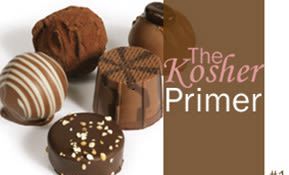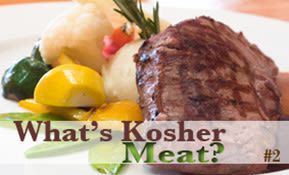
The Kosher Kitchen
Just because the Baba Sali’s picture is hanging on the restaurant wall, doesn’t mean that the food there is kosher. Rabbi Yaakov Luban shows what’s really a kosher kitchen.

The Kosher Primer, Part 3
4. Caterers, Restaurants, Hotels:
Caterers, restaurants, and hotels must be supervised by a reputable Orthodox Rabbinic authority.
It cannot be assumed that kashrut is maintained simply because a kosher impression is created by an advertisement or by a statement, such as, “we serve a kosher clientele.” Too often, ‘vegetarian’ or ‘dairy’ restaurants are assumed to be kosher and beyond the need for supervision. Unfortunately, this is a prevalent misconception. Fish, baked goods, cheese, shortening, oil, eggs, margarine, dressings, and condiments are among the many foodstuffs requiring supervision in ‘vegetarian’ and ‘dairy’ restaurants. Even those food items that are kosher in their raw states could be rendered non-kosher when prepared on equipment used for non-kosher food. For these reasons, reputable kosher supervision is required.
5. Meat and Milk in the Kosher Kitchen
The Torah forbids: 1) cooking meat and milk together in any form; 2) eating such cooked products, or 3) deriving benefit from them. As a safeguard, the Rabbis extended this prohibition to disallow the eating of meat and dairy products at the same meal or preparing them on the same utensils. Furthermore, milk products cannot be consumed after eating meat, for a period of time. There are different traditions for how long to wait between meat and dairy, but the most prevalent custom is to wait six hours.
Meat may be eaten following dairy products with the one exception of hard cheese that is aged 6 months or more, which requires the same waiting time as that of dairy after meat. Prior to eating meat after dairy, one must eat a solid food, either drink a liquid or thoroughly rinse one’s mouth, and check the cleanliness of ones hands.
A. Utensils:
Unless one is a vegetarian and meat is totally excluded from his kitchen, a kosher kitchen must have two different sets of utensils, one for meat and poultry and the other for dairy foods. There must be separate, distinct sets of pots, pans, plates and silverware.
B. Washing Dishes:
Ideally, it is best to have two kitchen sinks, one for meat and the other for dairy. If this is not feasible, and one uses one sink for both meat and dairy, dishes and utensils should be placed and washed on a rack, so as not to touch the sink. Separate racks are to be used for meat and dairy use. Care must be taken to make sure that the water should not be allowed to rise to reach the level of the rack, and dishes cannot be soaked in a sink used for both dairy and meat.
6. Eggs
The eggs (or other by-products) of non-kosher birds or fish are not kosher. Caviar, therefore, must come from a kosher fish and this requires reliable supervision. Commercial liquid eggs also require supervision. Eggs of kosher fowl, which contain a blood spot, must be discarded, and therefore eggs should be checked before use.
7. Shortening and Oil:
Government regulations concerning the labeling of food ingredients have undergone strict changes. Not only must the label specify the type of shortening, i.e., vegetable or animal, but it must declare the actual source as well. Thus, it is commonplace to find mention of cottonseed oil, lard, coconut oil, and other oil sources. The result of this explicit label display is that the consumer can easily detect what is blatantly non-kosher. However, it is important to be aware that the kosher status of a product containing even pure vegetable shortening can only be verified by reliable kosher certification. The reason for this is that manufacturers of vegetable shortening often process animal fats on common equipment. Pure vegetable products may satisfy USDA guidelines for purity, however, in terms of Jewish law, vegetable oil may be non-kosher because it is processed on non-kosher equipment.
8. Emulsifiers:
Emulsifiers are complex substances that are used in many types of food production. They can perform a number of critical functions, among them acting as a surfactant (reducing the surface tension of a liquid) thus making oil and water soluble. Emulsifiers are critical components in many food items, such as margarine, shortenings, cream fillings, toppings, coffee creamers, whiteners, prepared cake mixes, donuts, puddings, ice cream, frozen desserts, instant mashed potatoes, peanut butter, breakfast cereals, chocolates and candies. Emulsifiers may be listed on the ingredient label as polysorbates, glycerides, mono and diglycerides, sorbitan monostearates, etc. Emulsifiers are produced from either animal or vegetable oil, and emulsifiers require reliable kosher supervision.
9. Flavors:
A critical sector of the food industry is manufacturers of flavors. Flavors, whether artificial or natural, are components of nearly every product. Flavor production is highly complex and uses raw materials from every imaginable source. Some common kosher sensitive ingredients used in flavors are fusel oil (which may be extracted from grape juice), glycerin and castorium (a beaver extract). Since the ingredient declaration never includes a breakdown of ingredients used in flavors, food items containing natural or artificial flavors require reliable supervision.
10. Fillings and Cremes:
All fillings, cremes, and fudge bases must be certified kosher because they may contain fats, emulsifiers, gelatin stabilizers and flavors.
To be continued.
(Reprinted with permission of http://www.ou.org/)












Tell us what you think!
Thank you for your comment!
It will be published after approval by the Editor.